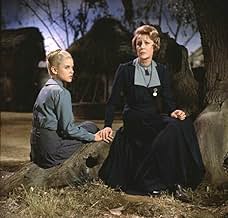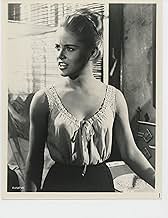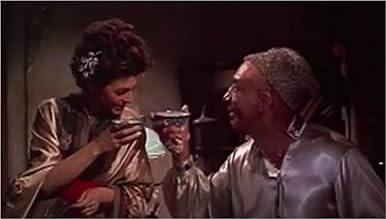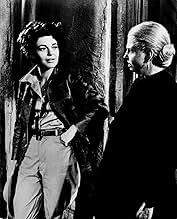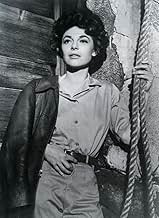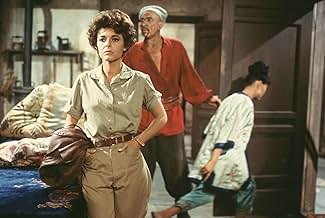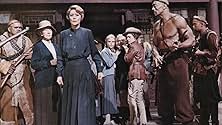NOTE IMDb
6,7/10
2,9 k
MA NOTE
En Chine en 1935, sept femmes missionnaires dévouées tentent de se protéger des avances d'un brutal seigneur de guerre mongol et de sa meute de guerriers sanguinaires.En Chine en 1935, sept femmes missionnaires dévouées tentent de se protéger des avances d'un brutal seigneur de guerre mongol et de sa meute de guerriers sanguinaires.En Chine en 1935, sept femmes missionnaires dévouées tentent de se protéger des avances d'un brutal seigneur de guerre mongol et de sa meute de guerriers sanguinaires.
- Réalisation
- Scénario
- Casting principal
- Récompenses
- 1 nomination au total
Lee Kolima
- Warrior
- (non crédité)
Avis à la une
It's 1935 in northern China near the Mongolian border. Agatha Andrews leads a mission where Dr. D.R. Cartwright (Anne Bancroft) arrives. Charles Pether (Eddie Albert) and Emma Clark (Sue Lyon) are two of the teachers. Refugees arrive from another mission after an attack by ruthless Mongolian warlord Tunga Khan.
It's legendary western director John Ford's final film. It would be nice to have more exterior shots of the landscape. The religious righteousness of Agatha Andrews could be more prominent earlier in the movie. It's also maybe more interesting to have the movie start with the doctor journey to the mission. I just want more foreshadowing of what happens between them later in the movie. Otherwise, this is an intriguing eastern. Tunga's brutality is believable. Sure it would be nice if a non-white guy could play the role but that's expecting too much for a film of this era.
It's legendary western director John Ford's final film. It would be nice to have more exterior shots of the landscape. The religious righteousness of Agatha Andrews could be more prominent earlier in the movie. It's also maybe more interesting to have the movie start with the doctor journey to the mission. I just want more foreshadowing of what happens between them later in the movie. Otherwise, this is an intriguing eastern. Tunga's brutality is believable. Sure it would be nice if a non-white guy could play the role but that's expecting too much for a film of this era.
John Ford's swan song is very underrated. Anne Bancroft plays a chain-smoking doctor who has fled the United States (for reasons unknown, unless they were explained during the minute or so I was away to answer the phone) to work at a mission in China. Margaret Leighton plays the head of this mission, a devout Christian who controls her underlings with strict rules. Various troubles ensue, the most prominent being the threat of a cholera epidemic, a raid by Mongolian bandits, and a pregnant woman who is nearing menopause, which makes the birth a very difficult situation. It is the second problem which I mention that takes up most of the plot. The mission has heard stories of these Mongolians in the nearby areas. Leighton is sure that they will never dare attack her mission, by the grace of God and America. But they do, and they keep all the white women hostage after killing off every Chinese person in sight. They believe that they can win a ransom for them. The tough Bancroft bravely opposes them, but she can make no headway by those means. Instead, the leader of the bandits demands sex. In this way, she is able to influence the way the women are treated (especially concerning the birth). The main conflict of the film is between Leighton and Bancroft. It's very 60s, with the progressive, liberated woman fighting against the strict, sexless one. The role of religion is very interesting in the film. It's shocking that Ford, a devout Catholic, would make the headmistress so foolish. It's a very intelligent criticism of the holier-than-thou attitude of some. When death looks imminent, Leighton seems almost excited to become a martyr; and she's willing and ready to take everyone else with her. When Bancroft sees her chance to save the others, Leighton viciously attacks her for being the "whore of Babylon." The final scene is quite excellent. What a great way for the greatest director of all time end his career.
...what a moving last picture for Ford's swansong.Too often underrated ,"Seven woman" in spite of a sometimes weak script-too many things happen in too little time- is perhaps the most modern film in Ford 's canon.
We find one of Ford's permanent features:a group of human beings in jeopardy who's got to struggle against an enemy:"Stagecoach" is the best example .Dudley Nichols's screenplay was inspired by Guy de Maupasssant's "Boule de Suif".
Women always played a prominent part in Ford's canon.Ford's world is deceptive :it seems to be a male world but actually women are the strongest and the wisest (Jane Darwell's character in "Wagon Master" ,the soldiers' wives in "Fort Appache" ).It was only natural that Ford's last movie was an all-women film (all men,including Albert's character are caricatures.) And these women are very endearing.Anne Bancroft,one of the greatest actresses America ever had, shines all along the movie ,and even when the script verges on grotesque ,she's still beaming, fascinating ,never losing her sense of humor.Even when she "becomes Chinese" ,nobody would think of laughing at her.She's so strong an actress that we seem to know her heroine intimately,her life in NYC people dispensaries,her sad love stories.With her masculine swagger,her boots ,her cigarettes and her whiskey we see a broken woman who has lost all her illusions.She's an atheist,which is very rare in Ford's canon.
Religion is in the center of many a Ford movie ."Seven Women" takes place in a mission .All these women put their faith in God and ...in America (We're American citizens!).One of them (Margaret Leighton) is particularly interesting : a tight-lipped puritan at the beginning of the movie,she becomes,slowly but inexorably ,a mystic lunatic,mentioning Babylon and sinners.Like "Stagecoach" ,"seven femmes " borrows from Maupassant.Like his heroine,"Boule De suif" Cartwright gives her life in sacrifice so the others can survive.
Six Woman are leaving Sodom under an ominous sky :one of them is screaming about lust while the blonde schoolteacher (Sue Lyon,whose role is an equivalent of Caroll Baker's in "Cheyenne Autumn ,though it's an underwritten part ),along with the newborn child, represents hope for the future:all that she went through ,her late heroine (she was the only one to be nice with Cartwright when she arrived)might help her to carry on.But Ford's last opus,like Huston's "the dead" is a very pessimistic opus.
We find one of Ford's permanent features:a group of human beings in jeopardy who's got to struggle against an enemy:"Stagecoach" is the best example .Dudley Nichols's screenplay was inspired by Guy de Maupasssant's "Boule de Suif".
Women always played a prominent part in Ford's canon.Ford's world is deceptive :it seems to be a male world but actually women are the strongest and the wisest (Jane Darwell's character in "Wagon Master" ,the soldiers' wives in "Fort Appache" ).It was only natural that Ford's last movie was an all-women film (all men,including Albert's character are caricatures.) And these women are very endearing.Anne Bancroft,one of the greatest actresses America ever had, shines all along the movie ,and even when the script verges on grotesque ,she's still beaming, fascinating ,never losing her sense of humor.Even when she "becomes Chinese" ,nobody would think of laughing at her.She's so strong an actress that we seem to know her heroine intimately,her life in NYC people dispensaries,her sad love stories.With her masculine swagger,her boots ,her cigarettes and her whiskey we see a broken woman who has lost all her illusions.She's an atheist,which is very rare in Ford's canon.
Religion is in the center of many a Ford movie ."Seven Women" takes place in a mission .All these women put their faith in God and ...in America (We're American citizens!).One of them (Margaret Leighton) is particularly interesting : a tight-lipped puritan at the beginning of the movie,she becomes,slowly but inexorably ,a mystic lunatic,mentioning Babylon and sinners.Like "Stagecoach" ,"seven femmes " borrows from Maupassant.Like his heroine,"Boule De suif" Cartwright gives her life in sacrifice so the others can survive.
Six Woman are leaving Sodom under an ominous sky :one of them is screaming about lust while the blonde schoolteacher (Sue Lyon,whose role is an equivalent of Caroll Baker's in "Cheyenne Autumn ,though it's an underwritten part ),along with the newborn child, represents hope for the future:all that she went through ,her late heroine (she was the only one to be nice with Cartwright when she arrived)might help her to carry on.But Ford's last opus,like Huston's "the dead" is a very pessimistic opus.
Finished in 1965 and belatedly released a year later, 7 Women represents director John Ford's final bow on the silver screen after a long and extremely significant foray into the world of celluloid. Existing as something of an atypical swan song for the long renowned film-maker, the feature is one that suffers from an overall lack of ideas, but which also pulls this weakness to be its central force of power. Employing a recurring theme of empowerment in the face of defeat and a defiance of authority, blind-faith and outdated ideals, 7 women is at its heart, sixties film-making at its most empowering and critical. It may not be as elegant as other works of the decade, nor as moving, but blessed with a wonderful sense of character and performance, John Ford achieves one of his most significant works here with a piece of film that all things considered, should never be as such.
I say this, mainly, because 7 Women is something of a canned movie. In this vein, the feature, like a few of Ford's previous efforts, feels like a play rather than a movie. Through this minimalist tone, Ford strikes a stern focus on character and theme, rather than obtuse action or plot—two elements which could have easily been given the spotlight by any other film-maker had they chosen to. You see, telling the story of a small missionary camp set up in a civil-war-torn China during the late thirties, 7 Women finds its roots in theatre drama, yet also mixes an element of danger into the mix too, outside of any inherent character conflict (though, one could argue such plot devices are perfunctory and only serve merely as a catalyst to explore these characters more effectively). Under the attack of a rogue gang of savage bandits known for their pillaging, torture, rape and murder of several nearby missionary outposts, Ford attempts to bring out the absolute base levels of his characters—to put them under the microscope to see who they really are. The results are interesting, albeit predictable, yet the overall experience boils down to one of subtle reflection.
As mentioned above, and indeed more than made obvious by the movie's title, key to this somewhat somber approach is in the screenplay's devotion to character rather than plot; and what a character we have here. While ostensibly telling the story of the seven women staffed by the Catholic Church to help deliver these poor souls, the central point of Ford's story here instead chooses to focus on the black sheep of the bunch, Dr. Cartwright. Cartwright, played by an endlessly captivating Anne Bancroft, is a last-resort chain-smoking, binge-drinking, foul mouthed, pant-wearing doctor who would rather talk to the bottom of her glass than to the higher being in the sky everyone else around her seems content to confide in. Straight away Ford plays her as being as the misfit malcontent that she obviously would be in this situation, yet he does well to establish her as anything but incompetent with her duties. Following this theme through right to the movie's finest point (the very last scene which in itself is worth the ninety minutes that precede it), Dr. Cartwright ends up stealing the show at every turn—sure, there are ideas here about humanitarian needs outweighing those of a clergy (most of which are needlessly heavy-handed and all too frequent with no real penetration involved), and there are more than a few other interesting characters here, but for the most part 7 Women is much more the story of 1 Woman, and well, that's probably for the best.
This isn't to say that there's not much to see outside of this wonderful pairing of Ford and Bancroft; it's just that this will be what you no doubt will take away from the feature as being its most enjoyable aspect. And with that said, it's important to stress that while 7 Women may not be as wholly enjoyable or entertaining or indeed significant as some of Ford's previous work, it nevertheless manages to stand on its own two feet—much like our beloved Cartwright—without pandering to expectations either of its audience or of its society at the time. Much like many films of the sixties, 7 Women is a daring and often compelling look at ourselves, whether through our hopes and dreams, our loves and faiths or our demons and tragedies. Not only that but it's the final statement of a director that gave cinema many of its greatest hours, and in that vein, 7 Women gains some significance without ever sacrificing its distinctly restrained and quietly contemplative mood.
I say this, mainly, because 7 Women is something of a canned movie. In this vein, the feature, like a few of Ford's previous efforts, feels like a play rather than a movie. Through this minimalist tone, Ford strikes a stern focus on character and theme, rather than obtuse action or plot—two elements which could have easily been given the spotlight by any other film-maker had they chosen to. You see, telling the story of a small missionary camp set up in a civil-war-torn China during the late thirties, 7 Women finds its roots in theatre drama, yet also mixes an element of danger into the mix too, outside of any inherent character conflict (though, one could argue such plot devices are perfunctory and only serve merely as a catalyst to explore these characters more effectively). Under the attack of a rogue gang of savage bandits known for their pillaging, torture, rape and murder of several nearby missionary outposts, Ford attempts to bring out the absolute base levels of his characters—to put them under the microscope to see who they really are. The results are interesting, albeit predictable, yet the overall experience boils down to one of subtle reflection.
As mentioned above, and indeed more than made obvious by the movie's title, key to this somewhat somber approach is in the screenplay's devotion to character rather than plot; and what a character we have here. While ostensibly telling the story of the seven women staffed by the Catholic Church to help deliver these poor souls, the central point of Ford's story here instead chooses to focus on the black sheep of the bunch, Dr. Cartwright. Cartwright, played by an endlessly captivating Anne Bancroft, is a last-resort chain-smoking, binge-drinking, foul mouthed, pant-wearing doctor who would rather talk to the bottom of her glass than to the higher being in the sky everyone else around her seems content to confide in. Straight away Ford plays her as being as the misfit malcontent that she obviously would be in this situation, yet he does well to establish her as anything but incompetent with her duties. Following this theme through right to the movie's finest point (the very last scene which in itself is worth the ninety minutes that precede it), Dr. Cartwright ends up stealing the show at every turn—sure, there are ideas here about humanitarian needs outweighing those of a clergy (most of which are needlessly heavy-handed and all too frequent with no real penetration involved), and there are more than a few other interesting characters here, but for the most part 7 Women is much more the story of 1 Woman, and well, that's probably for the best.
This isn't to say that there's not much to see outside of this wonderful pairing of Ford and Bancroft; it's just that this will be what you no doubt will take away from the feature as being its most enjoyable aspect. And with that said, it's important to stress that while 7 Women may not be as wholly enjoyable or entertaining or indeed significant as some of Ford's previous work, it nevertheless manages to stand on its own two feet—much like our beloved Cartwright—without pandering to expectations either of its audience or of its society at the time. Much like many films of the sixties, 7 Women is a daring and often compelling look at ourselves, whether through our hopes and dreams, our loves and faiths or our demons and tragedies. Not only that but it's the final statement of a director that gave cinema many of its greatest hours, and in that vein, 7 Women gains some significance without ever sacrificing its distinctly restrained and quietly contemplative mood.
For a film nut like me. 7 Women offers a plethora of pleasures. Patricia Neal was suppose to star but ill health made her unavailable. Anne Bancroft took over as the drinking, smoking, swearing saint. and all the aspects of this complex character are totally real in Anne Bancroft's face. She arrives to the Mission in China like a benevolent tornado. The spectacular Margaret Leighton is the head of the Mission and she plays it like a raw nerve, Among the other women, Flora Robson, Queen Elizabeth to Laurence Olivier's Michael Ingolby in Fire Over England, brings a voice of reason that reassure us, Betty Field , Kim Novak's mother in Picnic, among a gallery of memorable characters, plays the pregnant middle age woman who offends the Christian mission for having had sex with her husband under their roof. Mildred Dunnock, Anna Lee and even Stanley Kubrick's Lolita, Sue Lyon is part of the Mission. On the other side, the villains, that offended so many people, John Ford casts his longtime companion Woody Strode. I understand and even accept all the criticisms listed in the reviews of this pages but, somehow, I can put all that aside and enjoy the plethora of pleasures that it offers.
Le saviez-vous
- AnecdotesAnne Bancroft recalled producer and director John Ford's tearing pages out of the script and described him as "Marvelous but loony."
- GaffesDr. Cartwright's hairstyle is not out of place for 1935. Dr. Cartwright is a strong, independent woman and it is not unusual for her to have this type of hairstyle - see Amelia Earhart. Besides, short hair worn off the shoulder was a very popular style in the 1930s.
- Citations
Dr. D.R. Cartwright: [to Tunga Khan, Bandit Leader] So long, ya bastard!
- Crédits fousPROLOGUE: "1935: North China near the border of Mongolia...A land of feudal war lords and marauding bandit armies...A time of lawlessness and violence."
- ConnexionsReferenced in MGM 40th Anniversary (1964)
- Bandes originalesJesus Loves Me
(uncredited)
Words by Anna B. Warner and David Rutherford McGuire
Music by William B. Bradbury
Sung by Sue Lyon and the children
Meilleurs choix
Connectez-vous pour évaluer et suivre la liste de favoris afin de recevoir des recommandations personnalisées
- How long is 7 Women?Alimenté par Alexa
Détails
Box-office
- Budget
- 2 300 000 $US (estimé)
- Montant brut mondial
- 228 $US
- Durée1 heure 27 minutes
- Couleur
- Rapport de forme
- 2.35 : 1
Contribuer à cette page
Suggérer une modification ou ajouter du contenu manquant

Lacune principale
By what name was Frontière chinoise (1965) officially released in India in English?
Répondre

